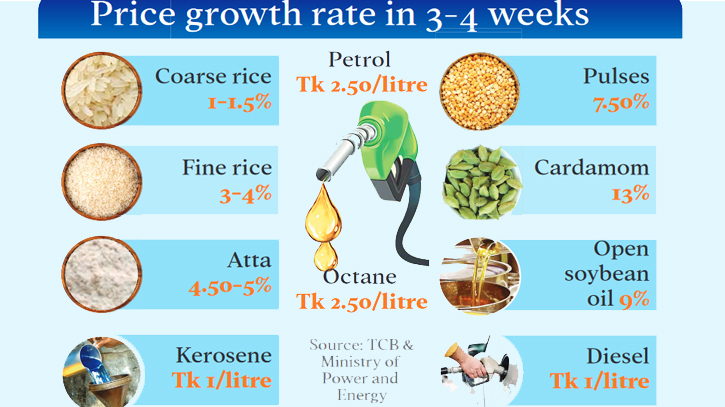
Photo: Messenger
The market for imported goods in Bangladesh has been in turmoil ever since the official announcement of a dollar price hike. The ripple effects have already begun to impact all sectors, with prices of daily essentials like rice, pulses, flour, and edible oil soaring. Concerns are mounting that costs may escalate further from next month, putting additional strain on the nation`s households.
Traders attribute the price hikes to the increased cost of importing and transporting goods due to the dollar appreciation, forcing them to raise the prices of goods in the market. However, economists argue that the dollar appreciation should not impact food prices within such a short period, questioning the validity of the traders` claims.
All kinds of spices are in highest demand during Eid ul-Azha, especially spice mixes (garam masala). Meanwhile, prices of cardamom, cinnamon, turmeric, dry chilies, and coriander have increased. Traders said that almost the entire market for cardamom and cinnamon is foreign-dependent. The dollar crisis in the country, reluctance to open LCs in banks, as well as hoarding by big companies, have also affected the spices market.
Some said that even though there is sufficient stock of spice products in the market, some unscrupulous traders are increasing prices on the occasion of Eid al-Azha. Many of those raising prices are not spice traders. They are gripping money from the market by investing in spices in the hope of higher profits by withdrawing investments from other businesses.
It is known that 90 percent of spice mixes need to be imported to meet the demand. Most cardamom is imported to Bangladesh from Guatemala. Some cardamom from India also comes to Bangladesh through the border. Cloves, one of the hot spices, come from Indonesia. A small amount of cloves is imported from Madagascar. Cinnamon in the market is imported from China and Vietnam.
Most cumin is imported into Bangladesh from India and Afghanistan. Cumin is also imported from Syria and China. However, Afghan and Indian cumin are more expensive due to their better quality. Traders said that prices of some spices have increased due to the increase in duty by the government.
Mohammad Majed, an importer of food and agricultural products, told The Daily Messenger, “Our costs have also increased as the price of the dollar has increased by Tk 7. So, there is no other way but to increase the prices of goods.”
However, Dr Zahid Hussain, former chief economist of the World Bank`s Dhaka office, said, “In the case of private imports, traders have so far bought goods at a price of more than Tk 117. So, increasing the prices of goods on the pretext of dollar appreciation is absurd.”
A significant portion of Bangladesh`s annual demand for food grains and spices is imported, including rice, lentils, oil, sugar, wheat, corn, onions, chickpeas, soybeans, and various other essential food products. Since the announcement of the increase in the dollar price, there has been considerable volatility in the market for these food items.
According to sources from the Trading Corporation of Bangladesh (TCB), the price of coarse rice has risen by 1-15 percent, and that of fine rice by 3-4 percent per kg in the last three weeks. During the same period, prices of packaged atta increased by 4.50-5 percent, open soybean oil and super palm oil by 9 percent, pulses by 7.50 percent, and cardamom by nearly 13 percent.
Traders attribute the price hikes to two reasons. Pradesh Poddar, a food product importer in Shyambazar, Dhaka, said, “Earlier, only a 10 percent deposit was required to open an LC, but now we have to deposit 100 percent of the goods` value to import products. As many businessmen have reduced imports, there is a shortage of products in the market, leading to price increases. Additionally, the food market has become volatile due to the recent rise in the dollar rate.”
Meanwhile, the government has already started setting automatic fuel prices in line with the global market. New fuel oil prices are announced monthly, depending on the dollar price. The price of diesel and kerosene has been increased by Tk 1 per liter, while petrol and octane prices have increased by Tk 2.50 per liter. However, when these prices were fixed, the dollar rate was Tk 110 in the country.
Economists suggest that since the dollar price has increased by Tk 7, the prices of all types of fuel oil may also rise from June. Economist Dr. Zahid Hussain said, “Almost all of our fuel oil depends on imports. So, the rise in the dollar price will definitely impact the prices of all types of fuel oil. And if fuel prices increase, costs may rise in many other sectors that depend on it, including transportation.”
Bangladesh`s power plants primarily rely on gas, coal, and fuel oil, most of which are import-dependent. Due to rising oil prices in the global market, emphasis is being placed on liquefied natural gas (LNG) and coal-based power generation. However, their prices are also gradually increasing.
In such a situation, experts fear that the increase in the dollar price in the country may escalate the overall cost of the electricity sector. Energy expert Professor M Tamim told The Daily Messenger, “If the government`s cost increases in importing fuel for electricity, it can be passed on to the people.”
Messenger/Fameema








